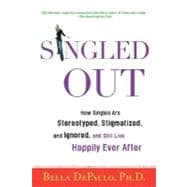
Note: Supplemental materials are not guaranteed with Rental or Used book purchases.
Purchase Benefits
What is included with this book?
SINGLED OUT
TABLE OF CONTENTS
Ch 1 Singlism: The 21st Century Problem That Has No Name
Ch 2 Science and the Single Person
Ch 3 Myth #1 The Wonder of Couples:
Marrieds know best.
Ch 4 Myth #2 Single-Minded:
You are interested in just one thing – getting coupled.
Ch 5 Myth #3 The Dark Aura of Singlehood:
You are miserable and lonely and your life is tragic.
Ch 6 Myth #4 It Is All About You:
Like a child, you are self-centered and immature and your time isn’t worth anything since you have nothing to do but play.
Ch 7 Myth #5 Attention Single Women:
Your work won’t love you back and your eggs will dry up. Also, you don’t get any and you’re promiscuous.
Ch 8 Myth #6 Attention Single Men:
You are horny, slovenly, and irresponsible, and you are the scary criminals. Or, you are sexy, fastidious, frivolous, and gay.
Ch 9 Myth #7 Attention Single Parents:
Your kids are doomed.
Ch 10 Myth #8 Too Bad You’re Incomplete:
You don’t have anyone and you don’t have a life.
Ch 11 Myth #9 Poor Soul:
You will grow old alone and you will die in a room by yourself where no one will find you for weeks.
Ch 12 Myth #10 Family Values:
Let’s give all of the perks, benefits, gifts, and cash to couples and call it family values.
Ch 13 It is Perfectly Understandable That You Thought Singles Were Miserable and Lonely: Here’s Why
Ch 14 To Be or Not to Be Single: Why Does Anyone Care?
Ch 15 The Way We Could Be
The New copy of this book will include any supplemental materials advertised. Please check the title of the book to determine if it should include any access cards, study guides, lab manuals, CDs, etc.
The Used, Rental and eBook copies of this book are not guaranteed to include any supplemental materials. Typically, only the book itself is included. This is true even if the title states it includes any access cards, study guides, lab manuals, CDs, etc.
Excerpted from Singled Out: How Singles Are Stereotyped, Stigmatized, and Ignored, and Still Live Happily Ever After by Bella DePaulo
All rights reserved by the original copyright owners. Excerpts are provided for display purposes only and may not be reproduced, reprinted or distributed without the written permission of the publisher.